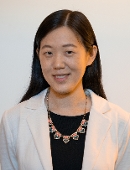
Xiang Xu, PhD
About Me
Dr. Xiang Xu is an Assistant Professor of Radiology at the BioMedical Engineering and Imaging Institute (BMEII) at the Icahn School of Medicine at Mount Sinai. She earned her PhD in Physical Chemistry from New York University. Before joining BMEII at Mount Sinai, she completed a postdoctoral fellowship and served as an Assistant Professor at the F.M Kirby Center for Functional Brain Imaging at Kennedy Krieger Institute and the Department of Radiology at the Johns Hopkins University.
Dr. Xu’s research career focuses on developing new nuclear magnetic resonance (NMR) and magnetic resonance imaging (MRI) methodologies to study in vitro and in vivo systems. She is particularly interested in chemical exchange saturation transfer (CEST) MRI. This branch of MRI technique enables one to detect low concentration agents that have exchangeable protons with higher signal sensitivity by exploiting their exchange with water protons. Current projects in Dr. Xu’s lab involve development of novel techniques to improve CEST imaging in terms of speed, sensitivity and motion robustness and translating these techniques to human imaging applications. Currently Dr. Xu is focused on using the CEST effect of glucose to study blood brain barrier functions in multiple sclerosis, brain tumors and other neurodegenerative diseases.
For more details, please visit the lab website at https://labs.icahn.mssm.edu/xiang-xu-lab/
Language
Position
Research Topics
Blood-Brain Barrier, Brain, Brain Imaging, MRI, Magnetic Resonance Imaging, Multiple Sclerosis
Multi-Disciplinary Training Areas
Artificial Intelligence and Emerging Technologies in Medicine [AIET], Neuroscience [NEU]
About Me
Dr. Xiang Xu is an Assistant Professor of Radiology at the BioMedical Engineering and Imaging Institute (BMEII) at the Icahn School of Medicine at Mount Sinai. She earned her PhD in Physical Chemistry from New York University. Before joining BMEII at Mount Sinai, she completed a postdoctoral fellowship and served as an Assistant Professor at the F.M Kirby Center for Functional Brain Imaging at Kennedy Krieger Institute and the Department of Radiology at the Johns Hopkins University.
Dr. Xu’s research career focuses on developing new nuclear magnetic resonance (NMR) and magnetic resonance imaging (MRI) methodologies to study in vitro and in vivo systems. She is particularly interested in chemical exchange saturation transfer (CEST) MRI. This branch of MRI technique enables one to detect low concentration agents that have exchangeable protons with higher signal sensitivity by exploiting their exchange with water protons. Current projects in Dr. Xu’s lab involve development of novel techniques to improve CEST imaging in terms of speed, sensitivity and motion robustness and translating these techniques to human imaging applications. Currently Dr. Xu is focused on using the CEST effect of glucose to study blood brain barrier functions in multiple sclerosis, brain tumors and other neurodegenerative diseases.
For more details, please visit the lab website at https://labs.icahn.mssm.edu/xiang-xu-lab/
Language
Position
Research Topics
Blood-Brain Barrier, Brain, Brain Imaging, MRI, Magnetic Resonance Imaging, Multiple Sclerosis
Multi-Disciplinary Training Areas
Artificial Intelligence and Emerging Technologies in Medicine [AIET], Neuroscience [NEU]